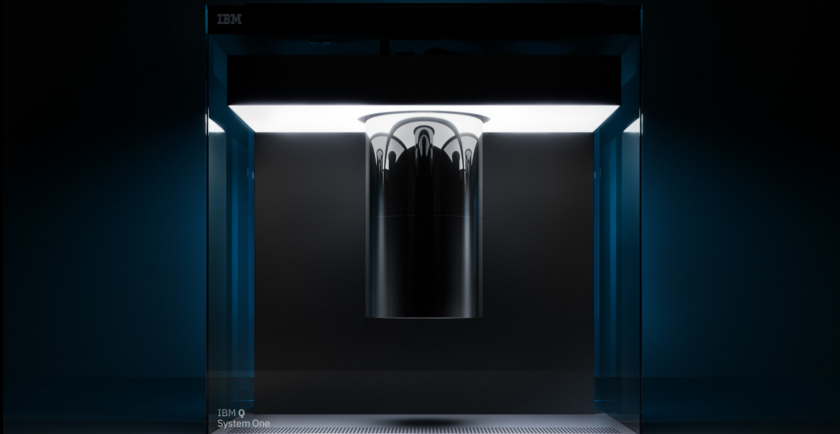M+E Connections

CES 2019: IBM CEO Touts New AI Initiatives, Q System One Quantum Computing System in Keynote
Story Highlights
LAS VEGAS – IBM CEO and president Ginni Rometty used her opening keynote at the Consumer Electronics Show (CES) Jan. 8 to spotlight her company’s latest artificial intelligence (AI) initiatives, as well as the IBM Q System One, which is being billed as “the world’s first integrated universal approximate quantum computing system designed for scientific and commercial use.”
The theme of her presentation was “what’s next” for data, computing and society, Rometty told attendees. She went on to explain how technologies including AI, blockchain and the cloud are reshaping not only the business world, but also our daily lives, and predicted that new data will revolutionize how we live, work and play.
“There’s 2.5 quintillion bytes of data today,” she said.
One may think, therefore, “we don’t need more, but you would be surprised,” she told attendees, adding: “We estimate that less than one percent of the data that the world is actually emitting – putting out there – is actually collected and actually analyzed.” That’s “deep data,” she noted, pointing out that “if you could” collect and analyze that data “some really wonderful things can be learned” that can benefit society.
As an example of what IBM is achieving by unlocking such data, on the AI front, she said IBM Research’s “fingernail sensor” prototype, when combined with AI and machine learning, could change the way that clinicians use data, including changes in a person’s grip strength, to monitor and track disease. The sensor measures how a fingernail bends and moves continuously throughout the day to indicate grip strength, which is a key biomarker for health.
By continually collecting data and feeding it into AI algorithms, the sensor may one day provide clinicians with a more accurate picture of a patient’s grip strength and movement over time, which could enable doctors to provide more personalized treatment recommendations for a variety of conditions, including Parkinson’s Disease, according to Rometty.
On that note, she announced a new initiative with The Michael J. Fox Foundation to better understand Parkinson’s Disease. IBM also launched a new tool with Medtronic that it said was designed to help people with diabetes better predict the likelihood when they will experience a low glucose event within an upcoming 1-4 hour window.
Also on the AI front, IBM Research previously unveiled Project Debater, which the company said was the first AI system that can debate humans on complex topics. At CES, IBM has now shared a new dimension for that technology: Project Debater – Speech by Crowd. The experimental cloud-based AI platform uses the core AI behind IBM Project Debater to collect free-text arguments from large audiences on debatable topics and automatically constructs persuasive viewpoints to support or contest the topic, according to IBM.
IBM Q systems, meanwhile, are “designed to one day tackle problems that are currently seen as too complex and exponential in nature for classical systems to handle,” the company said in a news release. Future applications of quantum computing could include finding new ways to model financial data and isolating major global risk factors that will enable people to make better investments, or “finding the optimal path across global systems for ultra-efficient logistics and optimizing fleet operations for deliveries,” it said.
IBM also announced plans to open its first IBM Q Quantum Computation Center for commercial clients in Poughkeepsie, New York, in 2019. The new center will tout some of the world’s most advanced cloud-based quantum computing systems, which IBM said will be accessible to members of the IBM Q Network, a global community of Fortune 500 companies, startups, academic institutions and national research labs working with IBM to advance quantum computing and explore practical applications for business and science.
On the blockchain front, Rometty highlighted how the technology can be used to achieve better food safety.
Rometty started her presentation by boasting about the latest achievements of IBM inventors, who received a record 9,100 patents in 2018, marking the company’s 26th straight year of U.S. patent leadership, she said. IBM led the tech industry in the number of AI, cloud computing, security and quantum computing-related patents granted, according to the company. Almost 50% of the 2018 patents related to pioneering advancements in AI, cloud computing, security, blockchain and quantum computing, IBM said.
The industry-leading 1,600 AI patents alone that IBM inventors were granted in 2018 included new ways to use that technology to help people converse and protect the earth’s lakes and waterways, according to the company. AI also played a large role in the more than 1,400 security patents IBM inventors were granted in 2018, including an AI-powered security approach to combat voice phishing, it said.









